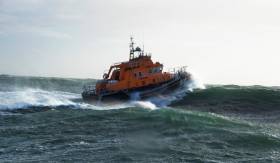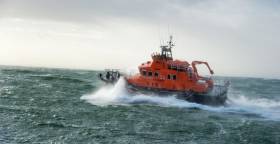Displaying items by tag: Tuskar Rock
Rosslare Harbour Lifeboat Assists Two On Yacht Off Tuskar Rock
#RNLI - Rosslare Harbour RNLI volunteers launched their all-weather lifeboat in the early hours of this morning (Friday 28 April) following a call for help from a yacht with two men onboard off Tuskar Rock.
The 15m yacht broke its mast on a passage from Kinsale to Howth, some four miles south of Tuskar Rock Lighthouse.
The two men onboard, who are experienced sailors, decided not to run the engine for fear of fouling the propeller due to the amount of rigging and rope in the water.
They were quick to call for help, and the Irish Coast Guard requested the all-weather lifeboat from Rosslare Harbour to launch at 12.40am.
Weather conditions at the time was favourable, with a moderate sea swell and a northerly wind of Force 3 to 4.
Once on scene, the lifeboat crew towed the sailing vessel into the shelter of Rosslare Europort, where it was tied up at 4am.
Speaking following the callout, Rosslare Harbour RNLI volunteer lifeboat press officer Jamie Ryan commended the quick action of the two crew aboard the yacht.
“They did the right thing this morning and raised the alarm when they started to encounter problems. Our volunteers responded rapidly and we were delighted to help the vessel and her crew safely to shore.”
Ryan added: “We would remind anyone taking to the sea over the Bank Holiday weekend and on into the main boating season to respect the water.
“Always carry a means of calling for help and keep it within reach. Wear a personal floatation device. Check the weather and tides. Tell someone elsewhere you are going and when you will be back. Wear appropriate clothing for the conditions and your trip.”
#RNLI - Rosslare Harbour RNLI's volunteer crew launched their all-weather lifeboat at 2am this morning (Wednesday 30 March) on request by the Irish Coast Guard to attend an injured man who was working on the Tuskar Rock lighthouse.
Once on scene, 8km from Rosslare Harbour, the all-weather lifeboat deployed its Y-class rescue boat to reach the landing area on the rock, but due to a heavy swell a landing was not possible.
Lifeboat operations manager David Maloney had anticipated that scenario and had already requested the coastguard helicopter Rescue 117 from Waterford.
The helicopter was quickly on scene and lifted the injured man aboard, flying him to Waterford Airport where an ambulance was waiting to transfer him to hospital.
Apart from a heavy swell, weather conditions at the time were calm with a clear dry night. The lifeboat remained in the area until the airlift was completed and then returned to base at Rosslare Europort.
Commenting after the event, Maloney said: "The lifeboat crew were quite correct in not attempting to land on the rock due to a heavy Atlantic swell. We wish the man a full recovery."






























































